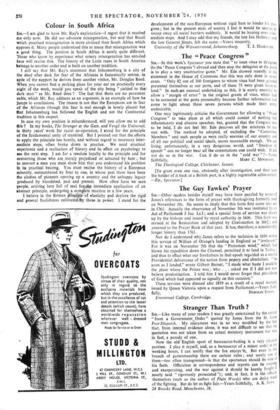Colour in South Africa
8nt.—I am glad to have Mr. Ray's explanation—I regret that it readied me only now. He did not advocate miscegenation, but said that Brazil which practised miscegenation is more civilised than South Africa which opposes it. Many people understood this to mean that miscegenation was a good thing. The position in South Africa is surely quite different. Those who know by experience what misery miscegenation has entailed here will realise this. The history of the Latin races in South America belongs to another order and is built on another tradition.
I still say that Mr. Ray's statement that Johannesburg is a city of the dead after dark for fear of the Africans is fantastically untrue, in spite of the support he derives from another visitor, Mr. Douglas Reed. When you cannot find a parking place for your car on practically every night of the week, would you speak of the city being "yielded to than dark man" as Mr. Reed does ? The fact that there are no pavement cafés, which Mr. Ray adduces as an argument, is an example of how he jumps to conclusions. The reason is not that the Europeans are in fear of the Africans (though this fear is real enough in lonely places) but tat Johannesburg has followed the English and not the Continental tradition in this respect.
In case my own position is misunderstood, will you allow me to add this ? In my books, The Stranger at the Gate, and Yergil the Universal, in thirty years' work for racial co-operation, I stood for the principle of the fundamental unity of mankind. But I pointed out that the efforts to apply the principle too hastily, and without regard to necessary inter- mediate steps, often broke down in practice. We need practical experience and a realisation of history and its effect on psychology to see the next step. I am for a resolute loyalty to the principle and for converting those who arg,merely prejudiced or actuated by hate ; but to convert a man you must show him that you understand his problem in its practical bearing. You must realise the history of a European minority, outnumbered by four to one, in whose past there have been the clashes of pioneers opening up a country and the unhappy legacy produced by bloodshed, past and present. How often' have we seen
people, arriving here full of zeal fo immediate application of an abstract principle, undergoing a C2 etc reaction in a few years.
I believe in the Roman *- of elasticity and deplore the rigid and general foolishness cultivatedy those in poi/er. I stand for the development of the non-European without rigid bars to hinder his pro- gress ; but in the present state of society I feel it would be unwise le sweep away all social barriers suddenly. It would be leaping over inter- mediate steps. And I may add that my friends, the late Jan Hofmer and the late General Smuts, felt the same.—Yours sincerely, University of the Witwatersrand, Johannesburg. T. J. HAARHOEF.














































































 Previous page
Previous page